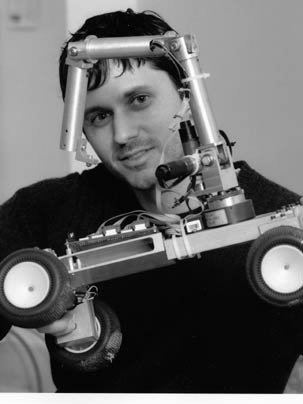Karl Iagnemma, an MIT research scientist in mechanical engineering now developing rovers to traverse the rocky dunes of Mars, has applied the language and symbols of science to the rough terrain of the human heart--and he's done it with such success that Hollywood is taking note.
Warner Brothers has bought the rights to Iagnemma's 2003 collection of short stories, "On the Nature of Human Romantic Interaction." Brad Pitt is slated to produce the title story as a feature film once it is adapted into a screenplay.
All eight stories in the book explore the inner lives and emotional perplexities of people trained to think in algorithms or equations, physics or math.
In Iagnemma's title tale, Joseph, a young mathematician, attempts to "map" his tangled love affair in Venn diagrams and veiny equations, only to discover, as Iagnemma told MIT's Spectrum, that "love is too complex to reduce to an equation."
Joseph tries haplessly, repeatedly, to run the numbers on his romance as his job at a place called "the Institute" provides a backdrop peppered with drastic, sometimes fatal events. Alexandra, the object of his desire, eludes him.
Although melancholy pervades Joseph's world, wry resourcefulness gives his story texture. He studies regional history, finding solace in past generations of heartbreak. He envisions a future cure for his failed romance that will take place in Huntsville, Ala.--as far from the Institute as he can imagine. (Huntsville, as many MIT readers know, is a center for NASA, hardly a heartbreak-free zone.)
And he grapples with mystery, declaring, "There are events in nature that cannot be explained or reproduced, that simply are. It's enough to give a person hope."
Iagnemma admits there are similarities between engineering and writing, if not relating: Both involve logic, problem-solving and creativity.
And the robot-building author should know. A native of Detroit, he received the S.B. in mechanical engineering from the University of Michigan in 1994, and the S.M. and Ph.D. degrees from MIT in 1997 and 2001.
He also won Playboy's College Fiction Contest as a grad student and the Paris Review's Plimpton Prize the year he got his doctorate. In 2002, Boston publisher Houghton Mifflin named Iagnemma's story "Zilkowski's Theorem" one of the best American short stories of the year.
Iagnemma has begun work on a novel and may try his hand at screenwriting. Meanwhile, back in mechanical engineering, he prepares the next generation of rovers to explore the Red Planet's mysterious, perilous surface in 2009.
Excerpt
From "On the Nature of Human Romantic Interaction," by Karl Iagnemma (Dial Press 2003):
This town: everywhere I look I see equations. Ice floes tumbling in the Owahee, snowflakes skidding past the TechInfo window: everywhere I look I see fractals and tensors and nonlinear differential equations. Some mornings when my TechInfo shift is over I stand in front of the Bradford Student Center and hand out pamphlets entitled "Proof of God's Existence by Series Expansion" and "The Combinatorics of Ancient Roman Orgies." Undergraduates walk broad circles around me. They're bundled in scarves and wool hats; only their eyes show. Alexandra tells me I make people uneasy, that not everything can be described by mathematics, and I tell her she's probably wrong.






